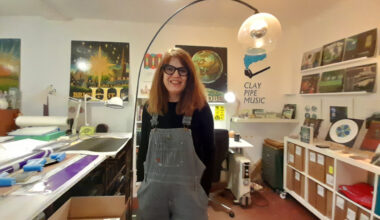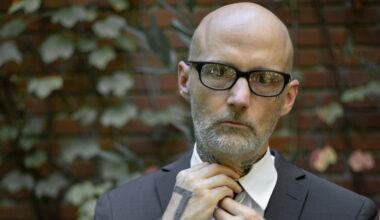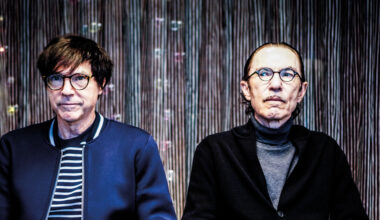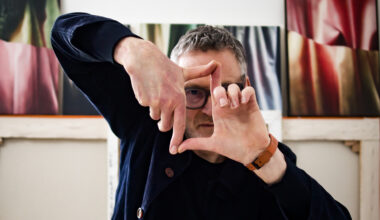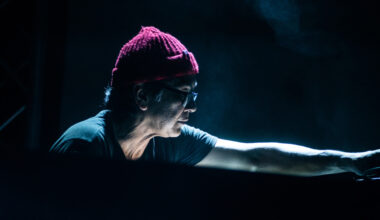Best known for his stadium-filling synthpop as M83, Anthony Gonzalez is returning to his early adventures in sound for the inspiration behind the album ‘DSVII’
Antibes, an ancient walled town on the Cote D’Azur between Nice and Cannes, is insanely beautiful. Its centre is a picturesque idyll of apricot-coloured cobbled streets and markets, while on the other side of the wall reclines a picture-postcard beach, the shade of the sea apparently chosen by Yves Klein. Lots and lots of yachts. Picasso lived and painted amid the palm trees awhile: a pretty museum to him now occupies an old castle. Various Impressionists were inspired here, as was F Scott Fitzgerald’s ‘Tender Is The Night’.
It’s the light. It hangs, with an aura. To the east is the Cap d’Antibes, a peninsula famed as a “millionaire’s paradise”, where the living is easy. Here we find the barefoot Anthony Gonzalez, better known as M83, who walks me past a swimming pool straight outta Hockney and welcomes me into his white, stylishly Zen living room. Not unluckily, he lives here, when he’s not living in Los Angeles. The thing is, he grew up in the area. He’s been home chilling out for the summer. It’s an understandable choice.
“It’s kind of a retreat for me,” he explains. “I got this house a few years ago: I always dreamed about getting a place near where I grew up. I used to spend lots of nights hanging out with my friends at the beach or in the forest, discovering music and… all the things. So living here is necessary for me right now. As I grow older I feel the need to be around my family and friends, it’s home. I feel at home in Los Angeles too, but Antibes is more… my blood. My roots. So I come here every summer, and this is where I wrote the ‘DSVII’ album”.
A sequel to 2007’s ‘Digital Shades Volume 1’, ‘DSVII’ is a kindred collection of ambient synth pieces, with subtle flecks of shoegaze, prog and drone, which Gonzalez wants to feel and stand separate to his more commercial, populist work. He sought “depth” away from the pressure of “providing pop music”. It’s solitary, reflective and swims in washes of nostalgia for a semi-imagined, innocent, idyllic past.
It taps into the spirit of old-school films, music and video games, which he loved and still loves, from the scores to ‘Final Fantasy’ to Brian Eno, Wendy Carlos, Mort Garson and Ash Ra Tempel, to the visions (both visual and aural) of Fellini and John Carpenter. There are slivers, too, of Jean-Michel Jarre and even Mike Oldfield, sanded with a sigh that the past was much, much better than now.
Coming from an older man, this might seem like “It was better in my day” grinching, but from this articulate, thoughtful 39-year-old (he looks much younger), who speaks with conviction about aesthetics across the arts, it’s an evident attempt to reach higher, to stretch above the contemporary babble of social media and instant gratification. He sincerely hopes the new album takes us to another time and place.
“I was coming out of a big, very intense tour with [2016 album] ‘Junk’,” he says. “Then I jumped right into another project for Cirque du Soleil – that was also tough, mentally and physically. I don’t regret any of it, and with everything I do I’m conscious it might not be as good as I hope, but I like to take risks, to try things and experiment. So after Cirque, I just wanted to think about myself, to be a little selfish, to spend some time in seclusion. I needed some privacy with my music. And just watching films, reading, being inspired by authors and film-makers. I tried to produce an album that would make me feel unattached to this period of time that we live in.”
This sense of nostalgia, of a yearning for something part-remembered, has always been an undercurrent in his music. Even if not so overtly as here…
“Yes it’s always been there,” he says. “The melancholy of the past is an important subject. I’m better about doing this now, but there was a time where I couldn’t watch any modern films or listen to any modern music. With this particular album, which is peculiar and specific, I feel it’s almost a statement. We forget the past. The younger generation don’t appreciate it any more, they have distractions. I wanted to go against this.
“Even though I wanted the album to sound like myself, I also wanted a bit of dust on it. I wanted it to feel old, dated, from a different world. Everything is ‘perfect’ now. I’m not attracted to that. Everything is so clean and clinical. I find that quite gross! I don’t recognise myself in that world.
“I miss the directors who were going on set not having a clue what they were going to shoot that day; leaving spaces for improvisation. The same in music, in video games. Technically people didn’t know for sure what they were doing, but there were some great mistakes and accidents. Beautiful accidents. This is what I miss today. Everything is calculated and a little soulless. I’m not the only one who feels like this, of course. Maybe a revolution is starting a little bit now?”
M83 is a bigger name than perhaps you realise. Founded in 2001 as a duo, but Gonzalez’s baby since 2009, they were picked up early for an international push by Mute. Albums such as ‘Before The Dawn Heals Us’ and ‘Saturdays = Youth’ gained traction with their blend of song and sound design exhibiting a winning warmth. Their slowburn/darkwave/post-rock vibe often felt a sibling to shoegazers like My Bloody Valentine and Slowdive as much as to more obvious electronic emissions. M83 supported on tours the likes of Depeche Mode, The Killers and Kings Of Leon. In 2010, Gonzalez moved to LA, in demand as a hip remixer and for film and commercial scores.

The 2011 double album ‘Hurry Up We’re Dreaming’ took the name to the next level, with the single ‘Midnight City’ a club-pop crossover hit (and used in a Gucci ad). It was Grammy-nominated for Best Alternative Album, sold a bucket-load in the States, and critics hailed its reverb-layered “saturated synths” as “among the most thrilling pop music of the year”. Comparisons were made with New Order and The Cure, but also “the current breed, The Knife, Empire Of The Sun”.
Since then Gonzalez has scored a Tom Cruise film (‘Oblivion’), and provided multiple TV themes (‘Outro’ was used to great effect in ‘Versailles’) and French films. ‘Junk’ reiterated his 80s fixations, boasted Beck as a guest, and didn’t quite match the success of its predecessor. It did well by any normal measure, but ‘Hurry Up…’ had been a big beast. Gonzalez then dived into being composer and musical director for Cirque du Soleil’s show ‘Volta’, after which he finally relaxed into what’s become the back-to-basics palate-cleanser ‘DVSII’.
“I feel like I don’t fit too well into a team experience,” muses Gonzalez, pondering his decision to run away and join the Cirque. “Don’t get me wrong, it was super rewarding. The spirit of working with a community of artists who were all trying to make a great show was so strong that you wanted to fight for the team. Even if you hadn’t slept for days, you wanted to make the production happy. That was the good side. But I like to go to bed at four or five sometimes. I like to see the sun come up. That’s not a schedule you can keep if you’re working in a team! I’m a solitary person, I prefer my own hours. I don’t like too much communication. I don’t even like to talk about myself…”
Oh, you must love interviews then!
“Don’t worry, you’re the first one on this record so I still have some fuel! No, it’s more that in a team, to be honest, I don’t feel good enough. I don’t feel legitimate. I didn’t study music. I don’t feel like I’m an especially good musician. I never learned techniques, I always learned by myself. When I was a teenager, I didn’t like jazz music, I thought it was too intellectual. I wanted something rough, so I listened to Sonic Youth, noise music and krautrock. I cared about the emotion, the soul, something beyond technique”.
That crossover of influences washes in and out on this album, which shifts from neo-drones to sweet proggy piano-like pieces…
“Yes, my big brother [filmmaker Yann Gonzalez] gave me my first music and film education. At a young age I fell in love with shoegaze, 70s prog, krautrock and minimal ambient electronic music, Eno’s ‘Music For Airports’ and ‘Discreet Music’, Tangerine Dream, Popol Vuh. This album’s a mix of all my teenage tastes. It’s all music I still listen to, to be honest.
“There’s something comforting about your childhood favourites. You like to go back there because it feels warm, protective. Recently with old friends we took some drugs and went to see Mogwai play a festival about an hour from here. The moon was bright and it was summertime, I was with my friends and there was something really beautiful about it. OK, it’s not always good to live in memories, but sometimes it’s what you need”.
A tangential memory for Gonzalez is that as a teenager he had football trials with AS Cannes, before an injury shunted him towards his first guitar. There’s more to this: his maternal grandfather, Laurent Robuschi, played for France in the 1966 World Cup in England. I am appropriately awestruck.
“Oh yes,” says Anthony more eagerly than I’d expected given his primary interest in the arts. “I’m always thinking about this. I watch football non-stop. It’s probably my biggest passion. I always wonder what my life would be like if I’d been a soccer player. I’d probably be a multi-millionaire and starting my music career right now. I feel like I’ve kind of wasted my life!”
I’m not sure if he’s kidding. He’s not exactly skint.
“When I go to bed and try to sleep”, he continues, “I close my eyes and imagine I’m a footballer. It’s fucking with my mind a little bit”.
Well, his grandad lived the dream…
“I’m so proud of him. I still spend time with him, watching games and playing pétanque. I have portraits of him in the French jersey, and playing for Monaco and Marseille. I fantasise about his life.”
Music is an entirely different ball game, and M83 feels sufficiently re-energised by making an album to suit his own most subjective tastes to now go back to operating in the big arena: his next LP, with “more high-tempo, lots of saturation and bendy synths”, is well under way and will lead to a tour.
“It’s like I needed to make this album so that I could write the next. After a couple of years of hard work, and not the success I was hoping for with ‘Junk’, I was disappointed and frustrated. I was down, depressed. This has put me back on track. It’s not accessible, it’s not commercial: I wanted to cleanse myself from all the terrible commercials I said yes to for the money. I needed to go against that and it has cleansed me.”
Surely the success he’s enjoyed this decade has its upside?
“Of course: I may be pessimistic about the world, but there are so many good things in it. When I was 16 or 17, starting this project in my bedroom, I could have never imagined going so far. I’m grateful. I was lucky, too, because it’s harder for young artists to find their voice now. I was there at the right time, in the right moment. I still can’t believe ‘Hurry Up, We’re Dreaming’ did what it did. And its success is what now allows me to be a little… weirder.
“At the same time, success can feel like I’m in jail. Artistically. I feel like people always expect that big sound, maybe an 80s vibe like on ‘Midnight City’. I’m prisoner to those sounds. Sometimes I almost despise that. If they think they know M83, but they only know ‘Midnight City’, that makes me sad. I want to show people that’s not who I am entirely, that there are other sides to me.”
‘DSVII’ displays that. Is it better than the first ‘Digital Shades’? Are we in ‘The Godfather: Part II’ territory, or ‘Tubular Bells II’?
“I honestly prefer this one. I put way more effort in, I put more of myself in. It felt natural and inspired. It was my first year back in the Cap D’Antibes and I was seeing plants, seeing forgotten worlds in my head. I felt creative and peaceful at the same time, which almost never happens”.
And the record is all about the analogue…
“But I always am, 95 per cent of my music is analogue. Even on ‘Junk’ we used old synths. There’s something missing without them. Maybe I’m too purist, but there’s warmth and comfort in an old Matrix 12 or an ARP 2600. They have a language that computers don’t. It’s a language that speaks to me. I’m receptive to that voice”.
Can you hear Antibes on this record?
“I hope so. The more ambient tracks have the most light; they’re brighter, less melancholic. They feel to me full of the imagery of the sun and sea and endless horizon.”
Visuals, as we’ve established, are very important to M83. The cover to ‘DSVII’ is a bonkers. It features a 70s-tinged illustration of a knight on a dinosaur approaching a mysterious pyramid. None more prog. Gonzalez makes no apologies.
“The escapism always starts with the cover. Whether it’s an album, a book, I want to be invited to something important. We need to take more time to create beautiful art. It’s getting lost a bit. I remember when I was young seeing all the ‘Dungeons And Dragons’ and heavy metal magazine covers, album art for Moebius and other amazing artists… you’d get lost in this fantasy world, made to use your imagination. You travel, even reading in bed. I love that feeling, and on this album I want to welcome people into that kind of adventure.”
Even more of a fantasy world is the berserk three-part short film ‘Extazus’, created by French experimental film director Bertrand Mandico to accompany ‘DSVII’. A gloriously florid, kinky and surreal work, inspired as much by Fellini and Del Toro as by 80s sci-fi freak-outs like ‘Phantasm’, ‘The Neverending Story’ and ‘In The Mouth Of Madness’, it’s weird and wondrous.
I mumble something about seeing a caped wizard in shades with a typewriter, paparazzi, murder, a warrior woman, metal gardens, snakes and orgasms. Gonzalez allows that it is to be interpreted however you want. He originally asked his brother and Mandico to collaborate on a piece, but “they’re two big thinkers. Bertrand’s imagination is… there’s something about the universe that he’s trying to share with the public. It’s ancient, but also modern. It’s singular. He’s ultra-talented and… completely mad in the head! It’s a phenomenal trip.”
The man who aged 17 took the name of a spiral galaxy, Messier 83, in the constellation Hydra, has always aspired to go somewhere, to go elsewhere, with his music. He gives me a lift back to the town centre and as I gush about the ridiculous beauty of the Riviera scenery outside the car window, he gestures at an atypical stretch of beach crowded with day-trippers.
“That”, he indicates, “is the only part of Antibes I don’t like.”
Always with the aesthetics. M83 has a rarefied vision of sorrow and joy.
‘DSVII’ is out on naïve

